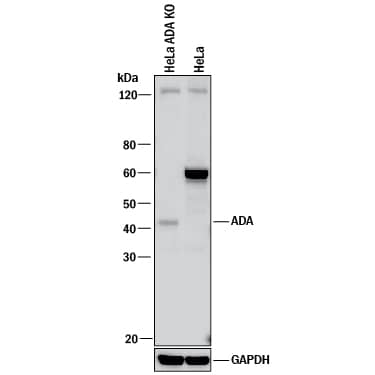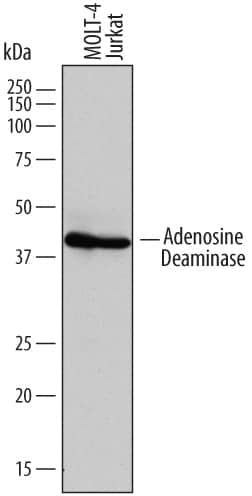Human/Mouse Adenosine Deaminase/ADA Antibody
R&D Systems, part of Bio-Techne | Catalog # AF7048

Key Product Details
Validated by
Knockout/Knockdown
Species Reactivity
Validated:
Human, Mouse
Cited:
Mouse
Applications
Validated:
Knockout Validated, Western Blot
Cited:
Western Blot
Label
Unconjugated
Antibody Source
Polyclonal Sheep IgG
Product Specifications
Immunogen
S. frugiperda insect ovarian cell line Sf 21-derived recombinant human Adenosine Deaminase/ADA
Met1-Leu363
Accession # P00813
Met1-Leu363
Accession # P00813
Specificity
Detects human and mouse Adenosine Deaminase/ADA in Western blots.
Clonality
Polyclonal
Host
Sheep
Isotype
IgG
Scientific Data Images for Human/Mouse Adenosine Deaminase/ADA Antibody
Detection of Human Adenosine Deaminase/ADA by Western Blot.
Western blot shows lysates of MOLT-4 human acute lymphoblastic leukemia cell line and Jurkat human acute T cell leukemia cell line. PVDF membrane was probed with 1 µg/mL of Sheep Anti-Human Adenosine Deaminase/ADA Antigen Affinity-purified Polyclonal Antibody (Catalog # AF7048) followed by HRP-conjugated Anti-Sheep IgG Secondary Antibody (Catalog # HAF016). A specific band was detected for Adenosine Deaminase/ ADA at approximately 41 kDa (as indicated). This experiment was conducted under reducing conditions and using Immunoblot Buffer Group 1.Western Blot Shows Human Adenosine Deaminase/ADA Specificity by Using Knockout Cell Line.
Western blot shows lysates of HeLa human cervical epithelial carcinoma parental cell line and Adenosine Deaminase/ADA knockout HeLa cell line (KO). PVDF membrane was probed with 1 µg/mL of Sheep Anti-Human/Mouse Adenosine Deaminase/ADA Antigen Affinity-purified Polyclonal Antibody (Catalog # AF7048) followed by HRP-conjugated Anti-Sheep IgG Secondary Antibody (Catalog # HAF016). A specific band was detected for Adenosine Deaminase/ADA at approximately 45 kDa (as indicated) in the parental HeLa cell line, but is not detectable in knockout HeLa cell line. GAPDH (Catalog # AF5718) is shown as a loading control. This experiment was conducted under reducing conditions and using Immunoblot Buffer Group 1. New adjunct appears with knockout cell line.Applications for Human/Mouse Adenosine Deaminase/ADA Antibody
Application
Recommended Usage
Knockout Validated
Adenosine Deaminase/ADA
is specifically detected in HeLa human cervical epithelial carcinoma parental cell line but is not detectable in
Adenosine Deaminase/ADA knockout HeLa cell line.
Western Blot
1 µg/mL
Sample: MOLT‑4 human acute lymphoblastic leukemia cell line and Jurkat human acute T cell leukemia cell line
Sample: MOLT‑4 human acute lymphoblastic leukemia cell line and Jurkat human acute T cell leukemia cell line
Formulation, Preparation, and Storage
Purification
Antigen Affinity-purified
Reconstitution
Sterile PBS to a final concentration of 0.2 mg/mL. For liquid material, refer to CoA for concentration.
Formulation
Lyophilized from a 0.2 μm filtered solution in PBS with Trehalose. *Small pack size (SP) is supplied either lyophilized or as a 0.2 µm filtered solution in PBS.
Shipping
Lyophilized product is shipped at ambient temperature. Liquid small pack size (-SP) is shipped with polar packs. Upon receipt, store immediately at the temperature recommended below.
Stability & Storage
Use a manual defrost freezer and avoid repeated freeze-thaw cycles.
- 12 months from date of receipt, -20 to -70 °C as supplied.
- 1 month, 2 to 8 °C under sterile conditions after reconstitution.
- 6 months, -20 to -70 °C under sterile conditions after reconstitution.
Background: Adenosine Deaminase/ADA
References
- Wolfenden, R.V. et al. (1969) Biochemistry 6:2412.
- Lowenstein, J.M. (1972) Physiol. Rev. 52:382.
- Giblett, E.R. et al. (1972) Lancet 2:1067.
- Coleman, M.S. et al. (1978) J. Biol. Chem. 253:1619.
- Baba, K. et al. (2008) PLoS ONE 3:e2788.
- Gines, S. et al. (2002) Biochem. J. 361:203.
Long Name
Adenosine Aminohydrolase
Alternate Names
ADA, ADA1
Gene Symbol
ADA
UniProt
Additional Adenosine Deaminase/ADA Products
Product Documents for Human/Mouse Adenosine Deaminase/ADA Antibody
Product Specific Notices for Human/Mouse Adenosine Deaminase/ADA Antibody
For research use only
